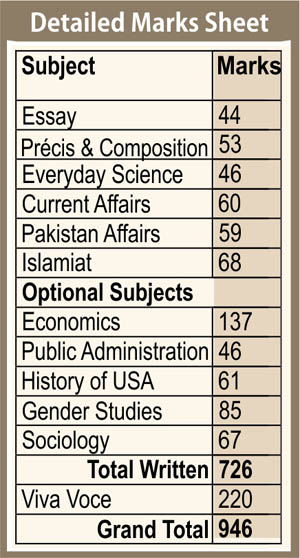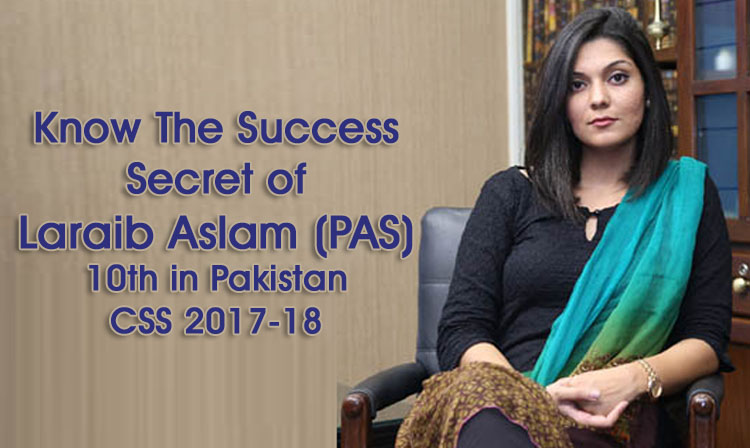Educational Background
After doing O/A level from Lahore Grammar School, I acquired my Bachelor’s degree in Economics from Kinnaird College for Women, Lahore. Immediately after my graduation, I started preparing for the CSS 2017 examination.
Pakistan Administrative Service (PAS): Most Conspicuous Attracted Feature
Being a student of economics and having my own understanding of the ‘real’ issues that Pakistan faces, I have always been interested in the processes of policy formulation, and execution thereupon. Thus, being a part of PAS did offer me not only the much sought-after prestige, but it also meant that I could do what I had always wanted to, that is, making a positive contribution towards my country and its people.
Key to Making a Difference in Written Part of CSS Exam
Being comprehensive, yet to the point! The only thing that differentiates those who pass the written part of CSS exam from those who fail is the ability to mould and present one’s knowledge the way the question demands. In my opinion, it is important to first understand the question and then have a clear brain-map as to how to attempt that particular question in the available time. Also, good presentation (neat handwriting, use of markers, drawing of diagrams or flow charts, etc.) always gets one some extra credit.
Strategy to Get Through CSS Compulsory Subjects
I adopted a targeted approach; my principal focus was on making concise notes for each subject and then discussing them in a group. For Current Affairs, I mostly relied on online sources. Similarly, for other compulsory subjects, I preferred gathering information from different sources rather than relying on a single book.
Key to Phenomenal Success
Focus, hard work and the fact that I got the right guidance and company during exam preparation.
How Answers Should be Written to Get Maximum Marks?
As I said, each answer must be well-structured and phrased in a way that the examiner gets the message very clearly. One should include as many flowcharts, maps and diagrams in papers like GSA, Pakistan Affairs and Current Affairs as possible, because these things help the examiner know that you fully understood the question. Moreover, your writing should be neat and legible. Headings and sub-headings are also very important. Using fancy or big words is not advisable.
Essay Structure and Strategy for Précis and Composition Paper
Practice is the key. I made a number of outlines during the preparation phase, instead of writing complete essays, because I focused on learning the art of rightly structuring the essay. In actual paper, I spent 45 minutes on writing the outline – a rough outline with all points first, followed by the final one wherein each point was grouped under its respective heading. If one does not make grammatical errors and has a fair sense of how the words are used, acing the English Essay paper is never a huge task.
For Précis paper, I simply learnt the list of 500 GMAT words (for Objective Part) and freshened up all grammar rules through a little practice of the grammar portion from past papers. For subjective portion, I divided time and areas – did précis in the first hour, pairs of words, idioms, correction, translation, punctuation, etc., in the second hour and attempted the comprehension in the remaining time.
How to handle Demotivations
Actually, I had only 4-5 months for CSS preparation. But, many people kept on telling me: “In such a short time, no one can prepare well enough to get through the CSS exam.” I did not, however, fret over this and just made sure that all my energies are channelled in the right direction, i.e. focused study. Believing in yourself, maintaining your cool in stressful situations and having a clear targeted approach are the ways to ward off any demotivation.
How a New Aspirant Should Start his Preparation?
I have already explained how important having the ‘right direction’ to study is. So, a new aspirant should look for a sincere guide and then start his/her preparations with a clear strategy and targeted approach.
 Tips on Selection of Optional Subjects
Tips on Selection of Optional Subjects
Do not seek advice from many people; it renders you confused. Instead, look at the syllabus and past papers of the subject under consideration. If you feel you can do it, go for it! And, if you have a background in that subject, it is always a plus point.
Notes-Making
Make a lot of flowcharts and headings in your notes; they should not be lengthy or in paragraph form. Your notes must consist of pointers, key ideas and terms, diagrams, etc. They should be structured in a way that once you look at them anytime, anywhere, the whole topic come to your mind.
Revision
The entire month before the start of CSS exam should be spent on revising what one has studied over the months. This is where the type of notes I mentioned earlier come in handy.
My Interview Experience
My interview experience was actually a delightful one. I was confident and, according to the interview panel, articulate as well. This was primarily because I had faith in whatever the preparation I had made and was, thus, successful in dealing with the pressure. Generally, the interviewers tend to ask lengthy questions, so it gets a little difficult to elaborate on all the dimensions of a question; however, I managed to break each question down in my mind, and then successfully framed the answers. A smiling face with a self-confident posture served as a cherry on the top. So, for everyone who is worried about any interview, I would like to point only one thing out: an interview is never just a test of your knowledge; it is actually more a test of how well you handle pressure, how articulate you are and what kind of a personality you have. Focus more on these elements.
Originally Published in
Monthly Jahangir’s World Times Magazine (December 2018)

2 replies on “Know the Success Secret of Laraib Aslam (PAS), 10th in Pakistan, CSS 2017-18”
Very useful..
[…] View Also: Know the Success Secret of Laraib Aslam (PAS), 10th in Pakistan, CSS 2017-18 […]